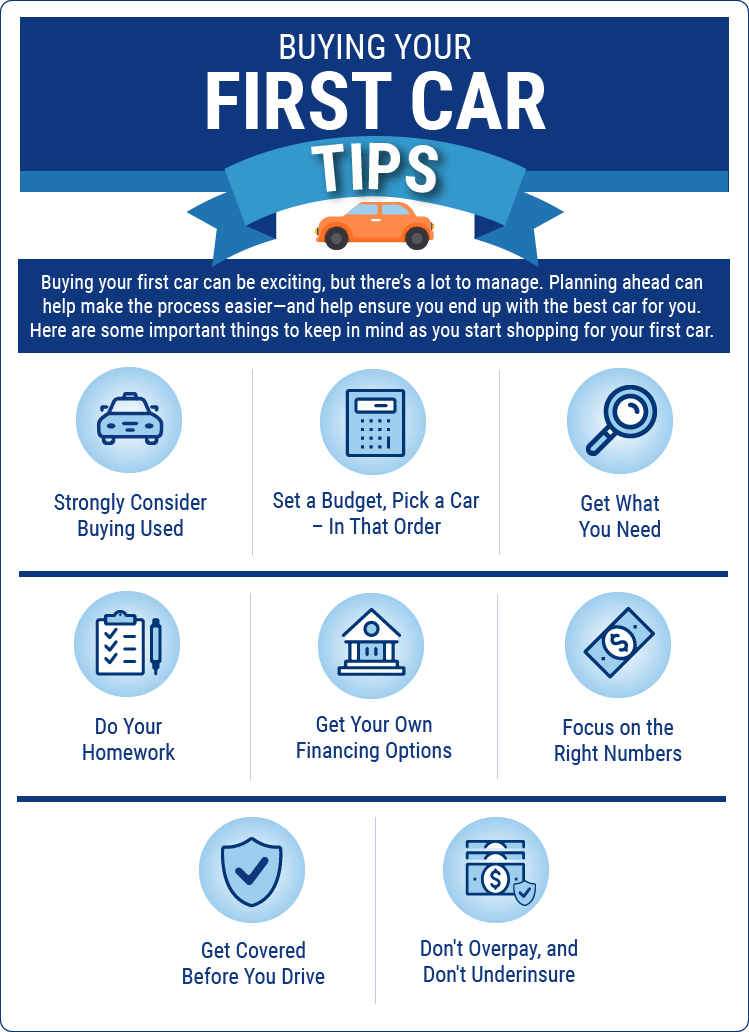8 Tips for Buying Your First Car

Paul Martin is the Director of Education and Development for Myron Steves, one of the largest, most respected insurance wholesalers in the southern U.S.

A lot of young adults today work and ride public transportation all the way through college. Others use a family car during their early driving years. In either case, this means many people are well into their twenties before they decide on the best first car to buy.
Buying your first car can be a daunting task, but it doesn't have to be. Considering things like engine size, safety ratings, and other common measures of quality can be confusing, to say the least. Plus then you have to factor in your realistic budget, the local market, and other personal factors. Regardless of income, you can find affordable car insurance within our trusted network.
If you're still wondering how to buy your first car, have no fear. Before you venture out to any car dealerships, take a look at our 8 first-time car buyer tips you should know when you're buying your first car.
1. Strongly Consider Buying Used
Some of the best first cars to buy end up being used models. On average, a new car loses 9% to 11% of its value the moment you leave the lot. Every following year for the next 5 years, the car depreciates by 15% to 25%. And after five years, a car is worth just 37% of whatever you agreed to pay for it.
If you take out a loan to buy a new car, depreciation means you're likely to owe more than it’s worth as soon as you start the ignition and drive away. That’s not good if you need to offload it later, only to find you owe more than any buyer will pay.
With a used car, you're paying for a car that has already undergone arbitrary depreciation. This means you won't pay an inflated price just for that "new car smell." Overall, these factors make used car dealerships for first-time buyers the best option.
2. Set a Budget and Then Pick a Car
The first question you need to answer is, “What is my budget?” It isn't exciting, but it'll narrow down the field from hundreds of cars to a handful (or two).
Keep in mind that budgeting for car ownership isn't just about paying the car payment. There are other associated costs, too. Here's a simple way to budget for all of the costs of owning a car:
- Calculate your basic cost of living: This will include your rent or mortgage, food, health insurance, and other spending allowances, like takeout meals.
- Calculate what's left: What remains after your basic cost of living is covered is what you can spend on your car payment, insurance, gas, and maintenance costs. Whatever remains is what you can afford to spend on the car payment itself.
Other options to make your car purchase more affordable:
- Reduce your monthly car payments by putting more down upfront.
- Find a car from a personal seller or classified ad. You might be able to pay cash and eliminate a monthly payment.
- Buy a car that needs some work if you or someone you know looks at it and knows how to fix it.
Setting a budget before you buy your first car is a critical step that shouldn't be skipped. Fortunately there are still ways to reduce the cost of your first car when you're on a budget.
3. Get What You Need
Once you know your price range for financing or a cash purchase, you can evaluate your needs. These are the features your first car absolutely must have. Keep in mind that your needs should always be kept separate from what you want. You may need:
- Great gas mileage to stay strictly within your monthly budget
- Room for extra passengers or cargo
- All-wheel drive for snowy winters
- Extra airbags so your mom won’t worry too much
Write these needs on your list and then stick to it as you research and shop for your first car. Your first vehicle may not have all the bells and whistles of your ultimate dream car, but it should at least check off everything on your needs list.
4. Do Your Homework
You know what you need. Now you need to know where to buy your first car. If you’re purchasing from a friend or neighbor, this part is easy. Just make sure you follow local laws regarding:
- A bill of sale
- Title transfer
- Sales tax
- Insurance
- Registration
The most important thing to embrace as a first-time car buyer is research. You have so much information at your disposal thanks to the internet and other resources. Use them all, so you aren't unpleasantly surprised down the road.
Other suggestions to keep in mind research-wise:
- NADA Guides and other publications like Kelley Blue Book can help you figure out how much your first car will cost, based on mileage and wear.
- Use online reviews and auto repair forums to find all kinds of dirt on the cars and trucks you like best.
- Find other owners to tell you what parts break first, how it rides, and whether that too-good-to-be-true gas mileage number really stacks up to daily use.
Don’t forget the most important research method of all: the test drive. A thorough test drive will take you down bumpy back streets and test high freeway speeds so you can get a feel for the car’s capabilities and know if it’s a good fit for you. Don’t feel pressured to hurry through this step, it could save you from regret later on.
5. Check Out First-Time Car Buyer Programs with No Credit History
A first-time car buyer program offers a loan to those with little to no credit history, which is ideal if you're buying your first car at 18. This type of first-time car buyer financing can be extremely helpful if you've never had to take out a loan before or haven't otherwise paid off any major expenses in life yet. You can get a first-time car buyer loan from a lender or from an automaker.
You can typically expect that first-time car buyer interest rates will be much higher due to the lack of credit history of the applicant. But you can still find first-time car buyer deals if you know where to look. When browsing options for who has the best first-time car buyer program, our research found that CarMax has one of the best options out there, requiring no minimum credit score to be approved. CarMax's program does come with interest rates of between 2.95% and 26%, however, so just keep that in mind.
If you're asking, "How do I find a first-time buyer car loan near me?" you can start off with a quick internet search. You should get plenty of advertisements for this type of loan in your area right away.
6. Focus on the Right Numbers
Never tell a salesperson how much you plan to pay each month for your first car. If you do, they may manipulate the cost of a car that is out of your price range to fit your budget. Salespeople can do this by:
- Adjusting the interest rate
- Offering you a longer term on the loan
- Restructuring the financing in a way that creates a payment that fits in your budget
So while you can technically "afford" it now, in the end, it can add thousands of dollars and years of extra payments on your first car loan. So, instead of offering a monthly dollar amount, stick to the total price. If you're willing to pay $8,000 for the car, stick to $8,000 in the negotiation, plus taxes, title, and registration. If the car lists for $9,000, you can try to talk the price down to $8,000 or go elsewhere. If it lists for $8,000, try to get taxes and legal fees included in the price.
It helps to bring an experienced buddy along to give you moral support, especially an older person who has purchased enough cars to last a lifetime. If you have an uncle who also knows mechanics and can look under the hood for you before you purchase, it can make buying your first car that much easier.
7. Get Covered by Auto Insurance before You Drive
You’re going to need coverage by law, and certain companies may not offer the best deals for first-time car buyer insurance. Insurance providers like proven, predictable, stable drivers, because they pose less risk of a costly accident and payout. You, on the other hand, are a first-time buyer, young, and not as experienced.
That's why it's critical to shop around for the best rates available to you before deciding on your first auto insurance policy. An independent insurance agent can help you do this.
8. Don't Overpay, and Don't Underinsure
Every state has minimum requirements for liability coverage. It is car insurance that pays for injuries or damage you might cause other people and their property. Your auto liability minimum requirements might look like this:
- $25,000 per person in an accident
- $50,000 per accident in total
- $20,000 for property damage
Your policy will list these amounts as 25/50/20. While $50,000 per accident might sound like a lot of coverage, it can actually add up to very little depending on the vehicles, people, and other factors involved. If the accident costs more than your coverage, you'll have to pay the difference. If you have no assets for a court to use to pay your debt, the injured person can go after your future earnings for an indefinite length of time until that debt is paid. So get as much liability coverage as you can afford.
If you’re financing your car with the dealership or a credit union, you'll also need collision coverage and comprehensive coverage, in most cases. Collision coverage pays for physical damage to your car after an accident, while comprehensive coverage can pay for damage caused by threats other than collision, including windshield breaks, hail damage, vandalism, and more.
9. (Bonus Tip) Work with an Independent Insurance Agent
If you go with a big-brand company that spends millions on advertising every year, you'll probably overpay for car insurance. An independent insurance agent, on the other hand, can compare lots of different policies and prices from all kinds of companies to find the one that offers you the most coverage for the best price.

How about that? We surprised you with 9 tips for first-time car buyers, instead. We hope our list of tips for how to buy a car for the first time was helpful. Now it's up to you to set your budget, do those test drives, and call an independent insurance agent. Your first car awaits you.
Bonus: Should I Buy a Car or a House First?
Many experts recommend buying a home before you buy a car, but this opinion varies depending on who you talk to, and what your personal needs are. It can be argued that a car is a depreciating investment, while a home or other piece of property can appreciate in value and actually make you money over time. Taking out a car loan can also impact your credit, which can affect your home-buying power later on. However, buying a car first can help you get comfortable with budgeting and factoring in large payments, which will ultimately be much less than those for a home.
https://www.edmunds.com/car-buying/how-fast-does-my-new-car-lose-value-infographic.html
https://www.carsdirect.com/auto-loans/first-time-car-loan-what-terms-to-expect
https://www.ramseysolutions.com/saving/car-depreciation#:~:text=AFTER%20ONE%20MINUTE%3A%20A%20brand,home%20for%20the%20first%20time!
